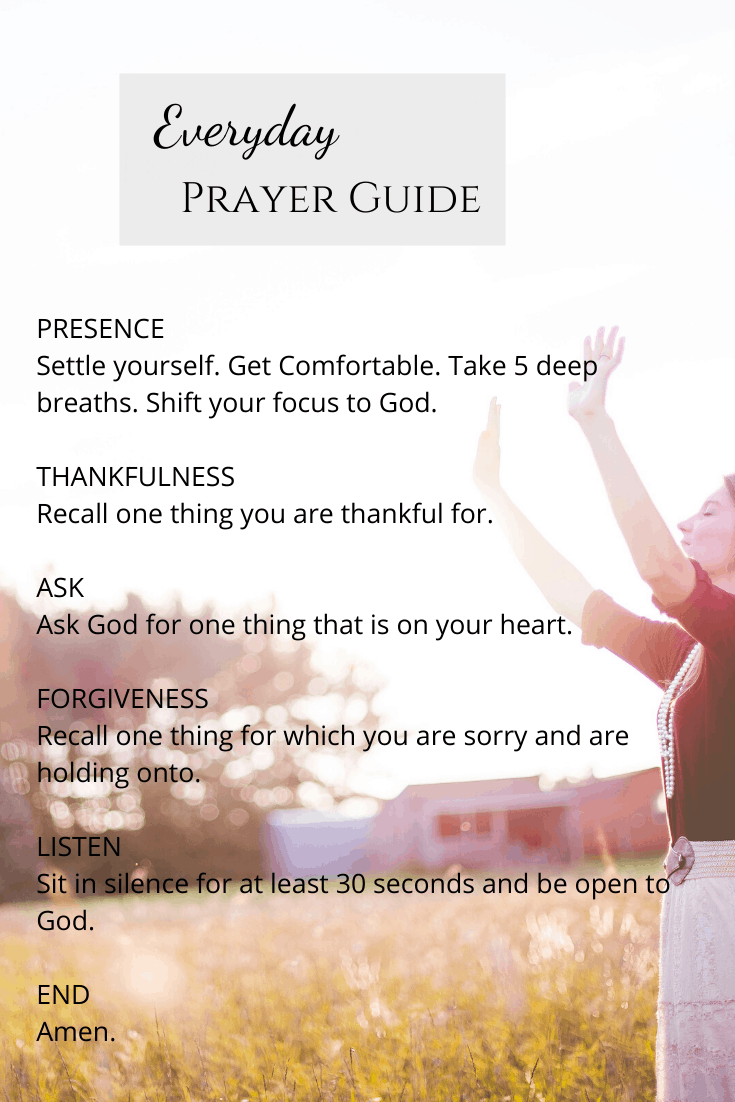If you’re anything like me, you have trouble with prayer: finding time to pray, knowing what to say, remembering to pray in the first place.
Prayer is kind of a funny thing, isn’t it? We’re taught how to pray – sort of – when we’re young. Usually those are standard prayers that are memorized and recited: the Our Father, a meal time prayer (Johnny Appleseed, anyone?), a bedtime prayer (Who came up with “As I lay me down to sleep” anyway?!)….
But as we grow, our prayer life doesn’t always grow with us. We teach kids how to memorize and recite certain prayers, but we don’t tend to teach adults how to talk to God.
While I grew up (nominally) Catholic, I consider myself a convert to Christianity. (It wasn’t until my mid-20s that I actually encountered Jesus and came to believe that the whole Christian story was true.) And one of the first things that I noticed, as I was trying to realign my life with the will of God was this: I had no idea how to pray.
I had friends who would seem to have conversations with God, some of which began with “Hey, God…” Those ones completely threw me for a loop: What do you mean you’re talking to God like a friend?! And I had friends who knew prayers from Really Old and Important Books by heart (like the Book of Common Prayer, and other books of very formal lists and formulations and instructions that I couldn’t name for the life of me).
But I had no idea how to pray. I didn’t have the words. I didn’t have the experience. I didn’t know what I was doing.
That’s why I like the Everyday Prayer. It’s short. It’s simple. You can do this prayer in 5 minutes, or you can take longer. It’s a formula, so you have some guidelines, but it’s not rote recitation.
And what I like best: I can squeeze this everyday prayer into 5 minutes of each day, in between packing lunches, eating breakfast, cleaning children, sewing lunch bags, washing dishes, running a youth group, and the other 8,000 things that I do each day. (Don’t we all?)
The Everyday Prayer Guide
The everyday prayer is something that you can do in 5 minutes each day. It can help to ground you, to remind you of what you have to be thankful for, and to listen to God’s leading in your life.
(The basic framework of this prayer comes from Rev. Dawn Davis’ Revive program.)
HOW TO DO THE EVERYDAY PRAYER
1. PRESENCE
Settle yourself. Get into a comfortable position. (Sitting and with good posture is a good idea.) Close your eyes or shift your gaze to the floor. Take 5 slow, deep breaths and shift your focus to God. Try to let distracting thoughts and noises just float past you. If your mind wanders, bring it back to the present moment (but without judgment or worry). Silence. (30 seconds)
2. THANKFULNESS
Bring to mind one thing that you have to be thankful for. Silence. (30 seconds)
3. ASK
Ask God for one thing that is on your heart. Silence. (30 seconds)
4. FORGIVENESS
Recall one thing for which you are sorry and are holding onto. Silence. (30 seconds)
5. LISTEN
Sit in silence for at least 30 seconds and be open to God.
6. END
Amen.

Reflections on the Everyday Prayer
The point of this prayer is not to hear some words spoken directly from heaven. In the “listen” portion, you may hear nothing at all. And that’s okay.
Part of the point of stilling our minds and being open to God is that it allows our own thoughts to quiet, to settle. As your own mind becomes more still, you will be better able to hear God’s voice, whether it’s an audible voice (This has never happened to me, but I have friends who audibly hear God and it completely blows me away!), a coincidence, an open (or a closed) door, the advice of a friend, a word from Scripture, etc.
The everyday prayer allows you to practice stillness – if only for a few minutes each day.
If you’re familiar with the ACTS method of prayer – Ask Confession Thankfulness Supplication – then you might find the order of this prayer unfamiliar.
When speaking with some friends about the ACTS method and the Everyday Prayer, some who grew up with the ACTS method mentioned that not asking for forgiveness before making a request felt wrong.
What’s theologically significant about putting confession last?
Getting into the habit of asking forgiveness before we proceed to make requests of God makes it all too easy to think that we have to say “I’m sorry” before we have the right to ask for something, does it not?
But grace is completely, radically, unearned.
Something that struck me about the order of thankfulness, supplication (the ask), and then confession is this: God’s favor is not something that we earn. God’s grace is something that overflows from his very being. We are the beneficiaries of a loving God who rescues us from evil and from death, who blesses our lives and transforms us into heavenly creatures beginning right here and right now. He does not save us and transform us only if we say that we are sorry.
Salvation and transformation are not earned through ethical reform. Ethical reform is, rather, the outworking of a transformation already in progress.
